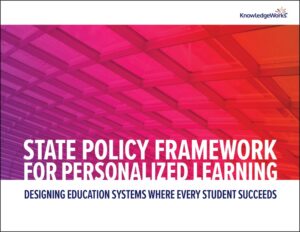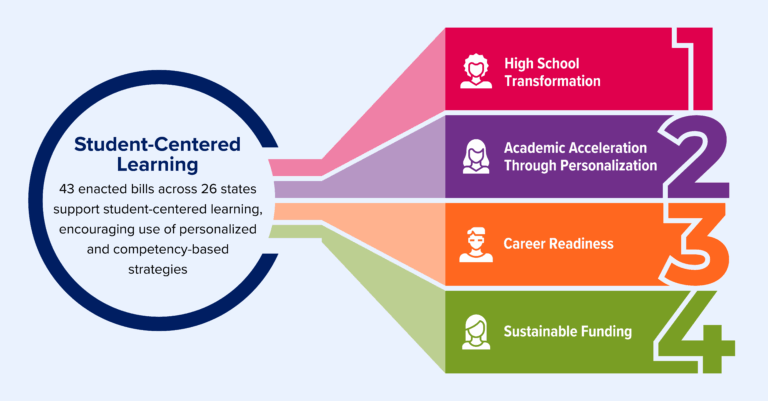When policymakers are in session in the spring, they are actively putting forth bills (also known as “legislation”) that they hope to make law. During this time, there may be legislation that directly affects school and district transformation to personalized, competency-based education. It’s a time that’s ripe for advocacy efforts.

To see some of the possible policy areas that relate to personalized learning, visit our state policy framework, intended to help states and stakeholders define and navigate their pathway from the exploratory phase of system design, where a limited number of districts engage in personalized learning practices, to statewide transformation. Learn more >>
While there are a number of ways to express your support or concern about a piece of legislation, a phone call to policymakers is a safe, effective way to make your voice heard – especially now, when in-person visits may not be allowed or perceived as safe due to COVID-19.
If you choose to call your policymaker during the legislative session, it is important to focus your conversation on specific issues that are pertinent to legislation currently being considered so that your message is not lost or irrelevant. For some, that could mean: “I’m calling today because a bill has been introduced to study the outcomes of personalized, competency-based education during the COVID-19 outbreak. I support this bill because I saw the impact the pandemic has had on my students and believe this is the right way forward.”
If you do not feel comfortable asking your policymaker to support or oppose a specific bill, you can also advocate by calling to educate them on an issue related to a bill. For example, you might say, “I’m calling today because a bill has been introduced to study the outcomes of personalized, competency-based education during the COVID-19 pandemic. As a leader in a school that focuses on personalized learning, I would like to tell you about my positive experience with personalized practices during this time.”
You may even consider coordinating a group of learners, practitioners, parents or others, to call policymakers to emphasize the importance of an issue to your learning community. If you go this route, remember to ensure you have gathered well-rounded representation of your learning community. And don’t assume everyone is on the same page at the beginning. Outline for folks specific talking points you’d like them to use, or, better yet, decide as a group what your message will be and make individual calls from there.
What to expect when you call
It’s likely you’ll speak with a member of a legislator’s staff or need to leave a message, but these calls will still be counted and your message heard.
When you call, be concise and keep it brief: focus on a single issue and convey two or three key points in your call. Unless prompted by questions from the policymaker or their staff, expect the call to last fewer than five minutes, as you will see in the sample transcript below. To help you stay focused, refer to any notes you or others may have regarding the issue you are calling about.
If you’re asked a question you can’t immediately answer, inform the policymaker or their staff that you will find the answer and get back to them – and follow through.
Regardless of whether a legislature is in session, engaging with policymaker offices through phone call is a great advocacy touch point that will help you establish a relationship with your legislators. In future articles, we will post about other strategies designed to help you deepen relationships with decisionmakers and stakeholders and make community voices heard.
Sample phone call transcript
Staff member: Thank you for calling (name)’s office. How may I help you?
Caller: Hello, my name is (your name) from (city), and I am calling on behalf of (your school/organization) where I am a (parent/coordinator/teacher/student, etc.).
Staff member: How can I help you today?
Caller: As a constituent of (names)’s district, (Insert information on why you support personalized learning, including a specific piece of legislation or program you support that has to do specifically with work in your school or district if so desired.)
Staff member: Thank you for sharing your thoughts with us. I will pass your comments along to the policymaker.
Caller: Thank you. I appreciate you sharing my thoughts on (the specific issue you’re calling about). Please feel free to contact me at any time to learn more about how we are innovating education to meet the needs of our students. We’d also be happy to host you all for a site visit at your convenience. (You can also ask to talk with the elected official’s scheduler to see about coordinating a safe site visit or in-person meeting.) Have a great day.
Ensuring equitable space drives collaboration and a desired future for all learners. Learn more about how futures thinking tools can help you advocate.
This resource was written by former Director of State Advocacy Anne Olson.




